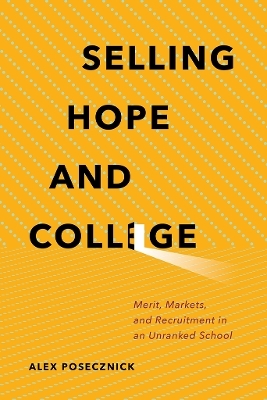
Selling Hope and College
Merit, Markets, and Recruitment in an Unranked School
Seiten
2017
Cornell University Press (Verlag)
978-1-5017-0982-1 (ISBN)
Cornell University Press (Verlag)
978-1-5017-0982-1 (ISBN)
- Lieferbar (Termin unbekannt)
- Versandkostenfrei innerhalb Deutschlands
- Auch auf Rechnung
- Verfügbarkeit in der Filiale vor Ort prüfen
- Artikel merken
Posecznick documents what it takes to keep a "mediocre" college open and running, and the struggles, tensions, and battles that members of the community tangle with daily as they carefully walk the line between empowering marginalized students and exploiting them.
It has long been assumed that college admission should be a simple matter of sorting students according to merit, with the best heading off to the Ivy League and highly ranked liberal arts colleges and the rest falling naturally into their rightful places. Admission to selective institutions, where extremely fine distinctions are made, is characterized by heated public debates about whether standardized exams, high school transcripts, essays, recommendation letters, or interviews best indicate which prospective students are "worthy."And then there is college for everyone else. But what goes into less-selective college admissions in an era when everyone feels compelled to go, regardless of preparation or life goals? "Ravenwood College," where Alex Posecznick spent a year doing ethnographic research, was a small, private, nonprofit institution dedicated to social justice and serving traditionally underprepared students from underrepresented minority groups. To survive in the higher education marketplace, the college had to operate like a business and negotiate complex categories of merit while painting a hopeful picture of the future for its applicants. Selling Hope and College is a snapshot of a particular type of institution as it goes about the business of producing itself and justifying its place in the market. Admissions staff members were burdened by low enrollments and worked tirelessly to fill empty seats, even as they held on to the institution's special spirit. Posecznick documents what it takes to keep a "mediocre" institution open and running, and the struggles, tensions, and battles that members of the community tangle with daily as they carefully walk the line between empowering marginalized students and exploiting them.
It has long been assumed that college admission should be a simple matter of sorting students according to merit, with the best heading off to the Ivy League and highly ranked liberal arts colleges and the rest falling naturally into their rightful places. Admission to selective institutions, where extremely fine distinctions are made, is characterized by heated public debates about whether standardized exams, high school transcripts, essays, recommendation letters, or interviews best indicate which prospective students are "worthy."And then there is college for everyone else. But what goes into less-selective college admissions in an era when everyone feels compelled to go, regardless of preparation or life goals? "Ravenwood College," where Alex Posecznick spent a year doing ethnographic research, was a small, private, nonprofit institution dedicated to social justice and serving traditionally underprepared students from underrepresented minority groups. To survive in the higher education marketplace, the college had to operate like a business and negotiate complex categories of merit while painting a hopeful picture of the future for its applicants. Selling Hope and College is a snapshot of a particular type of institution as it goes about the business of producing itself and justifying its place in the market. Admissions staff members were burdened by low enrollments and worked tirelessly to fill empty seats, even as they held on to the institution's special spirit. Posecznick documents what it takes to keep a "mediocre" institution open and running, and the struggles, tensions, and battles that members of the community tangle with daily as they carefully walk the line between empowering marginalized students and exploiting them.
An anthropologist by training, Alex Posecznick manages the programs in Education, Culture, and Society, and International Education Development at the University of Pennsylvania’s Graduate School of Education, where he also serves as a member of the Associated Faculty.
Introduction: An Uncertain Beginning1. Extraordinary Mediocrity2. How to Sell Hope and Mobility3. It's All about the Numbers4. Being a "Real" College in America5. Financing Education and the Crisis of SustainabilityConclusion: Whither Ravenwood College?
| Erscheinungsdatum | 28.05.2017 |
|---|---|
| Zusatzinfo | 3 Tables, black and white |
| Verlagsort | Ithaca |
| Sprache | englisch |
| Maße | 152 x 229 mm |
| Gewicht | 454 g |
| Themenwelt | Sozialwissenschaften ► Pädagogik ► Erwachsenenbildung |
| Sozialwissenschaften ► Soziologie ► Makrosoziologie | |
| ISBN-10 | 1-5017-0982-8 / 1501709828 |
| ISBN-13 | 978-1-5017-0982-1 / 9781501709821 |
| Zustand | Neuware |
| Haben Sie eine Frage zum Produkt? |
Mehr entdecken
aus dem Bereich
aus dem Bereich
praktische Beiträge aus der Lehre
Buch | Softcover (2024)
Springer Vieweg (Verlag)
49,99 €
Lernende in ihrem Lernprozess wirksam begleiten und unterstützen. Ein …
Buch | Softcover (2024)
WBV Media (Verlag)
20,00 €
Prüfungsaufgaben - Rechnungswesen, Wirtschaft, Recht, Steuern
Buch | Softcover (2023)
Europa-Lehrmittel (Verlag)
26,90 €


